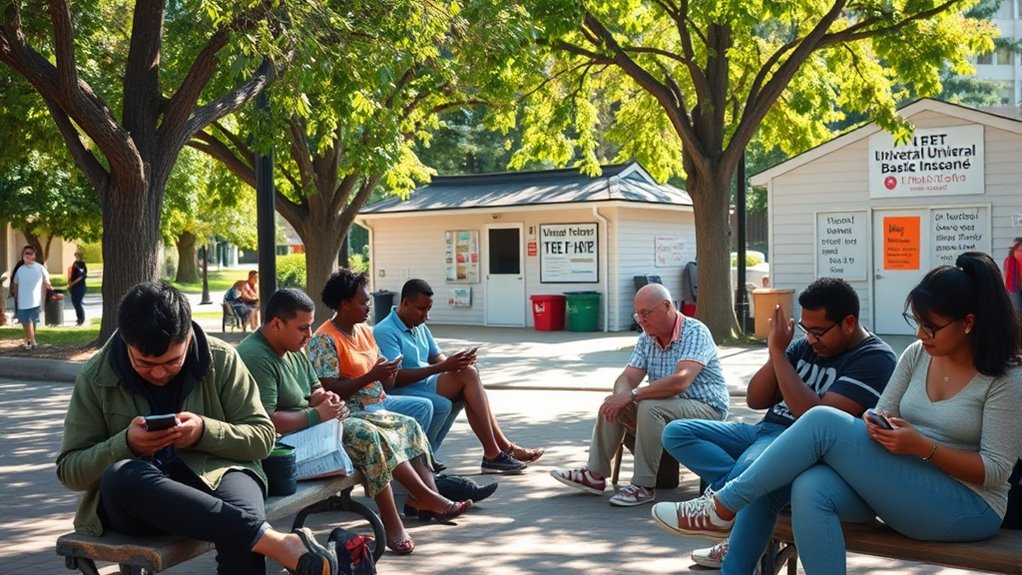UBI trials show that free money doesn’t make people lazy. Instead, recipients tend to work slightly fewer hours but make more thoughtful career choices, such as starting businesses or switching to roles they value more. They report better mental health and social connections, and their household finances become more stable. Far from encouraging idleness, UBI helps people improve their lives and community ties—if you want to understand how and why, keep exploring these real-world insights.
Key Takeaways
- UBI trials show only slight reductions in work hours, typically around 1 to 1.4 hours weekly.
- Recipients often shift towards more entrepreneurial and value-driven work rather than becoming lazy.
- Overall employment decreases modestly (2-4 percentage points), not enough to suggest widespread laziness.
- UBI improves mental health and social engagement, fostering motivation rather than apathy.
- Evidence indicates that free money encourages experimentation and long-term planning, not work avoidance.
Impact on Work Hours and Employment Patterns

Universal Basic Income (UBI) tends to lead to a reduction in work hours and shifts in employment patterns. When you receive UBI, you often work fewer hours—about 1 to 1.4 hours less per week—though this varies slightly across studies. The extra financial stability from unconditional cash transfers makes it easier to choose jobs that align with your personal goals, offering greater flexibility. However, your overall employment rate may decrease slightly—by around 2-4 percentage points—meaning fewer people participate fully in the labor market. Even partners of UBI recipients tend to reduce their work hours. During challenging times like the COVID-19 pandemic, employment rates among recipients improved but still remained lower than those who didn’t receive UBI. These shifts suggest a change in how and when people work, influenced by the guaranteed income. Additionally, understanding the resources and tools available can help individuals navigate these employment changes more effectively. The impact on labor market dynamics also highlights the importance of monitoring long-term trends to assess economic resilience. Recognizing how AI-enabled tools can support workers adapting to new employment patterns is increasingly relevant as technology continues to evolve. Moreover, incorporating natural techniques and optimal conditions from chia seed cultivation can serve as a metaphor for adaptable strategies in workforce management, emphasizing the need for sustainable and flexible approaches.
Changes in Occupational Choices and Self-Employment

Receiving UBI often leads you to make more deliberate and meaningful occupational choices. You become more selective in your job searches, prioritizing work that aligns with your values and interests. Many recipients shift from wage work, especially in agriculture, to self-employment in diverse sectors, exploring entrepreneurial ventures with financial backing. UBI encourages you to experiment with new business ideas, plan for long-term growth, and diversify income sources. It also boosts your financial confidence, enabling better decision-making for personal projects and investments. This flexibility allows you to pursue education, develop skills, and explore career paths without immediate financial pressure. Research shows that recipients often become more entrepreneurial and productive, countering concerns about laziness. Additionally, the increased financial security can lead to a more resilient approach to career development, supporting long-term stability and growth. Furthermore, tuning into your personal strengths and passions can lead to a more meaningful engagement with work, which is observed in performance improvements among recipients. Moreover, evidence from Honda Tuning indicates that targeted modifications and strategic planning can significantly enhance performance and satisfaction, paralleling how individuals can optimize their careers when given the right resources. Recognizing the rise of self-employment and entrepreneurial ventures in UBI trials highlights the shifting landscape of occupational choices driven by financial security. Incorporating mental health support and fostering a positive mindset can further empower individuals to pursue fulfilling careers.
Financial Stability and Household Income Effects

UBI provides a reliable source of income that enhances your financial stability and security. It helps reduce poverty by offering a steady, unconditional income, ensuring you can meet essential needs. Studies show UBI improves household financial security, lowering income uncertainty and helping you manage financial shocks. Additionally, digital literacy plays a crucial role in empowering households to navigate financial tools and resources effectively. Developing strong financial skills can further maximize the benefits of a stable income, especially in managing household finances efficiently.
Effects on Well-being and Social Connections

When you receive a UBI, you may notice improvements in your mental health and a greater sense of well-being. You might also find yourself more connected to your community and spending more time with friends. These social and emotional benefits can transform how you experience daily life and relationships. Additionally, the sense of increased skin hydration and nourishment provided by certain skincare routines can enhance your overall appearance and confidence. Moreover, positive changes in social interactions can be supported by automation in business, which helps streamline community services and fosters social cohesion. Upgrading local transportation options and vehicle tuning can also facilitate easier access to social activities and improve overall mobility within communities. Understanding personality compatibility can further strengthen these social bonds and improve community engagement. Recognizing the importance of social dynamics can help individuals build more meaningful and supportive relationships.
Improved Mental Health
Implementing Universal Basic Income (UBI) has been shown to considerably boost mental health by reducing anxiety, depression, stress, and apathy. You’ll notice fewer depressive moods, with recipients reporting 22.3% versus 32.4% in non-recipients, and mental health scores improve markedly. Stress levels drop, with only 17% experiencing high stress compared to 25%, while apathy decreases from 35.9% to 24.4%. This financial security enables you to plan better and engage more confidently in social activities, reducing feelings of isolation. The table below highlights key impacts: Existing data points. Studies indicate that UBI’s role in reducing poverty and economic insecurity directly contributes to these improvements in mental health outcomes. Additionally, increased financial stability can lead to enhanced mental wellbeing, fostering a greater sense of purpose and community connection. Regular access to psychological resources further supports long-term mental health. For instance, the availability of targeted support can help individuals develop coping strategies and resilience. Moreover, the sense of financial independence can empower individuals to pursue personal growth and social relationships more actively. Effect | Data Point |
| ——————————- | ———————————————- |
|---|---|
| Anxiety/depression reduction | 500,000+ cases delayed/avoided over 10 years |
| Mood improvement | UBI recipients report fewer symptoms |
| Stress levels | Substantially lower among recipients |
| Social engagement | Increased due to reduced anxiety |
| Long-term mental health gains | Persistent after socioeconomic adjustments. Implementing UBI also helps to alleviate financial burdens, which further supports mental well-being. |
Strengthened Community Ties
Have you ever noticed how financial stability can strengthen the bonds within your community? When people receive a steady income, they often become more involved in social activities, building stronger connections. UBI helps create a sense of mutual support, as beneficiaries and others share resources or collaborate on community projects. It also encourages participation in local events and civic activities, fostering a sense of shared purpose. With financial security, individuals feel more included and less isolated, promoting social cohesion across different groups. UBI can reduce tensions by alleviating economic stress, helping communities become more trusting and supportive. As social bonds tighten, residents experience greater belonging and emotional well-being, making the community more resilient and unified. Research indicates that UBI can lead to increased civic engagement and community participation, further strengthening social ties.
Enhanced Social Engagement
Enhanced social engagement through UBI can substantially improve your mental and emotional well-being. When financial support reduces social stigma, you feel more included and confident participating in community activities. UBI encourages you to engage more in social life, strengthening family bonds and fostering healthier relationships. With less stress and depression, your interactions become more positive and authentic. Increased autonomy from financial security allows you to connect more genuinely with others. Many recipients report higher life satisfaction and reduced loneliness, boosting hope and optimism. UBI also makes it easier to join caregiving, education, or entrepreneurial pursuits, expanding your social network. Overall, financial stability from UBI promotes a sense of belonging, enhances social support, and improves your mental health, leading to richer, more meaningful connections.
Comparing Different Models of Universal Basic Income

Different models of Universal Basic Income (UBI) vary markedly in how they provide support, how they’re funded, and who qualifies for benefits. You might encounter:
- Canonical UBI: Offers unconditional payments to all citizens, no matter their income or employment.
- UBI with Phaseout: Benefits decrease as income rises, targeting those most in need.
- Negative Income Tax (NIT): Low earners receive extra income, while higher earners pay taxes instead.
Funding methods also differ, relying on taxes, redistribution, or new revenue sources. Benefit amounts vary, from basic needs coverage to modest financial support. Eligibility is generally broad, with minimal restrictions. These models reflect different priorities and shapes of implementation, influencing their impact and feasibility.
Challenges, Limitations, and Future Research Directions

You need to contemplate the funding sustainability of UBI programs, as their high costs threaten long-term viability without significant tax reforms. Incorporating UBI into existing social support frameworks can lead to administrative complexities that hinder large-scale implementation. Additionally, gaps in long-term data limit understanding of UBI’s true impacts, making future research essential to inform policy decisions. Moreover, the current public assistance system faces challenges such as complex eligibility criteria and administrative burdens that can impede access and effectiveness.
Funding Sustainability Challenges
Funding sustainability remains one of the biggest hurdles for implementing universal basic income at scale. The total global cost could reach around $41.6 trillion, about 30% of current GDP, which is unfeasible without new revenue sources. Targeting only those below the poverty line lowers costs to $7.1 trillion and could boost global GDP by $49 trillion. To sustain UBI long-term, you need:
- Innovative tax systems, like taxing polluters or removing subsidies, to generate steady revenue.
- Effective measures to prevent tax base erosion and avoidance.
- Strategies to balance program costs with economic growth and productivity gains, minimizing inflation risks.
- Global cooperation is essential to develop equitable funding mechanisms and prevent tax havens from undermining revenue efforts.
Without sustainable funding, UBI risks inflation, political opposition, and administrative complexity, threatening its viability and long-term impact.
Integration With Existing Systems
Integrating UBI into existing social support systems presents significant challenges that can hinder its effectiveness and sustainability. You’ll face issues with eligibility criteria, as strict requirements may cause people to lose access to vital programs like SSDI, SSI, or Medicaid when their income rises. Benefits cliff effects can create disincentives, complicating the transfer to UBI. Administrative complexity adds another hurdle, requiring efficient identification and management of recipients. Systemic integration demands careful planning to prevent overlapping or duplicating benefits, which can waste resources. Public acceptance is essential, and policy reforms are often necessary to synchronize UBI with current welfare structures. Solutions include phased implementation and technological upgrades to streamline coordination, but systemic adjustments remain fundamental for smooth integration and long-term success.
Gaps in Long-Term Data
Despite the growing number of UBI pilot programs, significant gaps remain in understanding its long-term impacts. Most trials last only 1-3 years, making it hard to observe effects on health, economic stability, or intergenerational mobility. These short durations fail to capture behavioral adaptations or inflationary consequences. Additionally, many studies focus on small, specific populations, limiting insights into broader or diverse socioeconomic groups. They also often lack extensive measures of social well-being, education, and long-term employment effects. Challenges include the inability to simulate permanent policy environments, which impacts participant behavior and economic outcomes. Furthermore, inconsistent methodologies and scarce longitudinal data across different regions hinder comparisons, leaving key questions about UBI’s sustained effects unanswered.
Frequently Asked Questions
How Do UBI Trials Differ Across Various Countries and Cultures?
You’ll notice that UBI trials differ widely across countries and cultures. In low-income places like Kenya, programs target extreme poverty with small, regular payments, often funded by charities. In wealthier nations, pilots focus on employment effects and social welfare, funded by governments or natural resources. Cultural values influence acceptance, and payment methods vary from daily sums to annual checks, shaping how recipients spend and save.
What Are the Long-Term Societal Impacts of UBI Beyond Individual Benefits?
Think of society as a garden; UBI acts as nourishing rain that can cultivate deeper roots. Long-term, it fosters stronger communities, better health, and housing stability. It encourages education and social participation, creating a richer, more resilient ecosystem. While funding and implementation pose challenges, UBI’s potential to reduce inequality and promote societal wellbeing resembles sunlight breaking through clouds—transformative and essential for growth.
How Sustainable Are UBI Programs Financially Over Extended Periods?
You might wonder how sustainable UBI programs are financially over time. While they can boost economic stability and social well-being, funding remains a challenge. You’ll need stable, long-term sources like redistributive taxes or reallocated welfare funds. If you support international cooperation and integrate UBI into existing systems, the chances of maintaining these programs increase. Ultimately, sustainable financing depends on consistent political will and innovative funding strategies.
Does UBI Influence Educational Choices and Lifelong Learning?
Picture planting a seed for lifelong learning—UBI can be that water. It reduces financial worries, giving you the freedom to choose educational paths based on passion rather than necessity. With more security, you might take risks or pursue skills that truly interest you. While evidence shows varied effects, UBI generally offers a fertile ground for making educational choices that align with your long-term goals.
What Ethical Considerations Arise With Implementing UBI at Scale?
When implementing UBI at scale, you face ethical challenges like ensuring fair resource distribution and avoiding increased inequality. You must balance supporting individual dignity with maintaining societal cohesion, avoiding stigmatization or division. It’s vital to design policies that promote social justice without undermining work ethic or creating dependency. Ethical considerations also include sustainability, transparency, and respecting diverse values, so that UBI benefits everyone without unintended negative consequences.
Conclusion
You might be surprised to learn that UBI trials show recipients don’t become lazy—in fact, many work just as much or more. For example, a Finnish study found that 70% of participants reported increased well-being, with no decline in work hours. So, rather than discouraging effort, free money can boost your financial stability and overall happiness. It’s a promising step toward understanding how UBI could reshape our social and economic lives.









